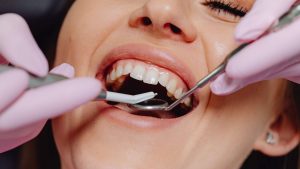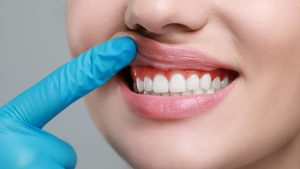You want fresh breath, yet some mouthwashes leave your mouth feeling dry and uncomfortable. While choosing the best mouthwash for bad breath might seem straightforward, it’s actually a bit more nuanced. You should consider factors like antibacterial properties, alcohol content, and natural ingredients.
Some mouthwashes promise cavity protection with fluoride, but do they really tackle the root cause of bad breath? Using mouthwash is just one part of
maintaining oral health, but how do you ensure you’re choosing the most effective option?
Effectiveness of Mouthwash
Mouthwash can help reduce the bacteria that cause bad breath, but it shouldn’t be relied on as a cure-all for
oral hygiene.
One of the biggest mouthwash myths is that it’s a standalone solution for fresh breath. While it offers temporary relief by reducing bacteria, it can’t replace brushing and flossing.
Some mouthwashes include fluoride, which provides added benefits like cavity protection, but they’re still just one part of a comprehensive routine.
Advertising influence often exaggerates mouthwash’s effectiveness, tempting you to view it as a miracle fix.
Instead, focus on a balanced oral care regimen. Mouthwash can reduce bacteria and provide fluoride benefits, but remember that it’s not a substitute for brushing and flossing to physically remove plaque.
Alcohol and Dry Mouth
Frequently, alcohol-based mouthwashes dry out your mouth, which can unintentionally worsen bad breath by allowing harmful bacteria to thrive.
The alcohol effects include damaging your salivary glands, leading to reduced saliva production. This decrease in saliva creates an ideal bacterial growth environment, exacerbating the problem you’re trying to solve.
When selecting a mouthwash, look at the ingredients closely. A high alcohol content can be counterproductive if you’re prone to dry mouth.
Instead, you might want to consider
dry mouth remedies that boost saliva production rather than inhibit it.
Staying hydrated is also crucial, as it naturally promotes saliva flow.
Alternative Mouthwash Options
Consider exploring alcohol-free mouthwashes like Aesop, which preserve your mouth’s natural balance and prevent dryness. These options often include natural ingredients that cater to different flavor preferences and provide eco-friendly options.
When choosing a mouthwash, consider these factors:
1. Brand Comparisons: Evaluate different brands to find one that aligns with your values and meets your needs. Look for those that use sustainable packaging and ingredients.
2. User Reviews: Check online reviews to gauge the effectiveness and satisfaction of other users. This can help you avoid products that don’t live up to their claims.
3. Flavor Preferences: Select a mouthwash with a flavor you enjoy, as this will encourage regular use. Brands offer diverse flavors, from minty to herbal, catering to various tastes.
These steps will ensure you make an informed choice.
Essential Oral Hygiene Practices
How can you ensure fresh breath and a healthy mouth by focusing on essential oral hygiene practices?
Start by integrating tongue scraping into your routine to remove odor-causing bacteria.
Mastering proper flossing techniques is crucial to effectively dislodge food particles and prevent plaque buildup, which mouthwash alone cannot tackle.
Stay hydrated to support saliva production, as saliva is your natural ally against bad breath.
Regularly visit your dentist for dental check-ups to monitor your oral health and catch potential issues early.
Remember, consistent plaque removal through brushing and flossing is vital.
Best Usage Tips
To maximize the effectiveness of your mouthwash, rinse for at least 30 seconds after brushing and flossing. Consider the following tips to enhance your routine:
1. Mouthwash Frequency: Use it no more than twice a day to prevent overdrying your mouth.
2. Rinsing Techniques: Swish vigorously to reach all areas of your mouth, ensuring thorough freshness.
3. Flavor Preferences and Ingredient Awareness: Choose a flavor you enjoy and be mindful of ingredients like alcohol that might cause dryness.
Listen to user experiences to find what works best for you. Discovering the right balance based on your personal needs can make a significant difference.
When to Seek Professional Help
If you notice persistent bad breath despite following a thorough oral hygiene routine, it’s time to
consult a dental professional. Persistent symptoms might suggest underlying conditions that need addressing.
When to consult isn’t just about bad breath; it’s about ensuring your overall oral health. A professional evaluation can uncover issues like gum disease, tooth decay, or even systemic conditions contributing to your halitosis.
Dentists can recommend treatments beyond over-the-counter solutions, ensuring a comprehensive approach to oral care. Don’t let embarrassment delay seeking help; early intervention is key.
Enhance Your Oral Health with Hand Family Dentistry
At Hand Family Dentistry, we understand the importance of maintaining a healthy and fresh oral environment. Our skilled team is dedicated to providing
comprehensive general and cosmetic dental services to help you achieve optimal oral health.
Whether you’re dealing with persistent bad breath or seeking to enhance your smile, our experts are here to guide you. We offer
personalized treatment plans tailored to your needs, ensuring that your oral garden flourishes.
Visit us for regular check-ups, professional cleanings, and expert advice to
keep your smile radiant and your breath fresh. Let us help you cultivate a harmonious oral landscape that you can be proud of.
Other Resources:
Please return to the home page to learn more about Dr. Hand, our top-rated
Fort Myers dentist.


